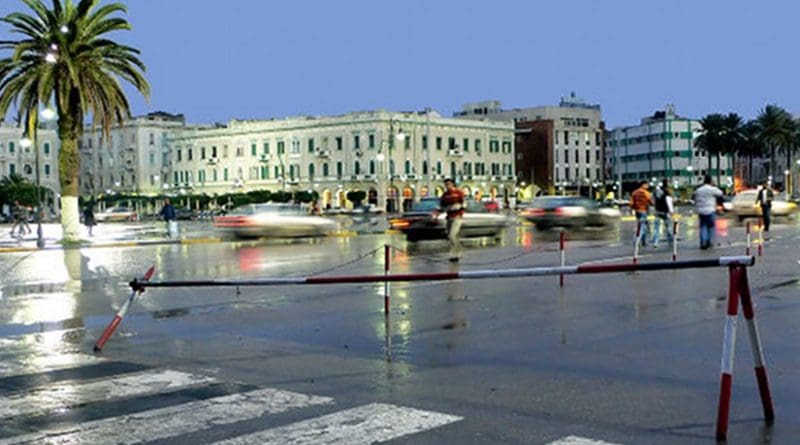Libya Forms Unity Government
By EurActiv
By James Crisp
(EurActiv) — A Libyan unity government was formed Tuesday in a UN-brokered deal, as mayors from the war-torn nation agreed to work together with EU and Mediterranean city leaders to rebuild the country into a modern state.
World powers are appealing to the country’s rival parliaments to back the new administration to end political paralysis that has provided fertile ground for jihadists and people-smugglers. Less than half of the members of the two parliaments signed up to the UN-sponsored agreement last month.
The news from Tripoli broke during the plenary session of the Euro-Mediterranean Regional and Local Assembly (ARLEM) in Nicosia, Cyprus.
Mayor of Tripoli Abdelrauf Beitelmal was at meeting of municipal bosses from the three shores of the Mediterranean, and the Committee of the Regions.
He told EurActiv, “As long as the government is approved, it is good enough for me. That’s what we need, we need some stability and peace.”
“It doesn’t matter who is in there, who cares as long as it is approved and can work?”
Beitelmal and the Mayor of Zintan, Mustafa Al Baruni, attended the ARLEM session as observers. At least two other mayors were meant to attend, but ran into visa and security problems.
A third mayor, Yosof Ibderi, who hails from Ghariya, was shot in the legs ten days ago. Delegates heard he continued to run his city from his hospital bed.
At the meeting in Cyprus, a new initiative – dubbed the Nicosia Platform by Committee of the Regions President Markku Markkula – was announced.
Markkula said that EU foreign affairs chief Federica Mogherini had personally told him that such municipal contacts were a priority for the bloc.
The platform will allow mayors and city leaders to share expertise and know-how on issues such as waste management, city planning, governance and regulatory frameworks.
Much of that infrastructure and expertise had been lost in the bloody civil war, delegates were told. Libyans had to learn to become administrators and citizens.
“Libya has never been a source of tension and instability in the Mediterranean, but now we are going through a severe crisis,” Zintan’s Al Baruni said.
“We need your support so we can regain our status as an actor in the euro-Mediterranean,” he said. “The Libyan people have always dreamt of a modern state.”
Tripoli’s Beitelmal said the war in Libya had an impact with how countries that had supported the Libyan revolution dealt with Libya, leading to problems with extremism, terrorism and illegal migration.
“We cannot combat illegal migration from only one side. We need to work together and we need real support,” he stated.
“But the Libyan people never felt regret about revolting against the previous regime. All the prices that we pay are legitimate,” he added.
As the session continued, feelers were put out among city leaders as to which regions could contribute to training and information sharing.
Flanders, for example, is earmarked to share expertise on water management, while Sicily has provisionally offered to help on universities.
Asked about the impact of the new unity government on the new platform, brokered by the mayor of Nicosia, Constantinos Yiorkadjis, Beitelmal was cautiously optimistic.
“The two things should go hand in hand,” he said. “But in reality – how will it work?”
Unity government
The unity government, headed by businessman Fayez al-Sarraj, who was named prime minister-designate under the UN-sponsored accord, comprises 32 ministers, the administration announced on its Facebook page.
“I congratulate Libyan people & Presidency Council on formation of Govt. of National Accord,” UN envoy Martin Kobler wrote on Twitter.
He urged the country’s internationally recognised parliament, the House of Representatives, to “promptly convene” and endorse the unity government.
There was no immediate reaction from the country’s two legislatures. Kobler, a veteran German diplomat, became UN special envoy for Libya in November, taking on his predecessor Bernardino Leon’s task of brokering a unity government.
Libya has been in chaos since the 2011 ouster of longtime dictator Muamar Gadaffi. A militia alliance, including Islamists, overran Tripoli in August 2014, establishing its own government and parliament, and causing the internationally recognised administration to flee to the country’s remote east.
The power-sharing deal has been given added urgency by fears that the Islamic State jihadist group, under pressure in Syria and Iraq, is building a new stronghold on Europe’s doorstep.
EU foreign policy chief Mogherini said the agreement on the members of the unity government was an “essential step” in implementing the UN-brokered deal.
“It is now for the House of Representatives and its Presidency to show the same spirit of compromise and sense of leadership, and promptly convene to endorse the proposed cabinet,” she said in a statement.

